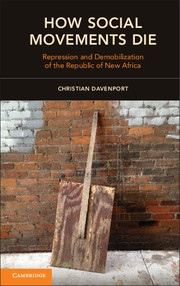12 - Understanding the Death of Social Movement Organizations
Published online by Cambridge University Press: 05 December 2014
Summary
In this book, I have attempted to shed some light on social movement demobilization (i.e., why individuals no longer associate with a political challenger pursuing social change, why the ideas initially pursued by dissidents shift in fundamental ways, why the activities selected by challengers are altered, and why formal institutions cease to exist). While demobilization has been discussed recently with specific attention given to al-Qaeda and the Iraqi insurgency as well as the Arab Spring, these discussions have unfortunately been largely based on little systematic scholarship. In part, this is because the existing literature has been generally concerned with movement emergence and variations in the conduct of challengers once they are under way. Newer work has explored the outcomes of SMOs, but essentially little to nothing exists on the topic of the processes of exactly how social movement organizations demobilize (i.e., how they die). The absence of this scholarship is also due to the fact that there are significant data requirements necessary for such an investigation. To analyze this topic, one not only needs information about what SMOs do (e.g., meso-level information) but also who is present for the challenge, information about what they say during their struggle with political authorities, some indication of what they feel (e.g., micro-level information), and what governments do against them (again meso-level information). One needs this information not simply during periods of repression but also in varied nonrepressive contexts – before (to establish a baseline), during (to know what happened), and after (to assess effects over time). Part of the explanation is also due to the fact that most research is dedicated to successful social movements (i.e., ones that we like and that achieve remarkable things, such as democracy, regime change, and decreased human rights violations). This focus has resulted in those concerned with the topic generally examining and understanding those who win and those that result in happy outcomes. Although comforting, such a focus does not always result in greater comprehension of the phenomenon in which we are interested.
- Type
- Chapter
- Information
- How Social Movements DieRepression and Demobilization of the Republic of New Africa, pp. 299 - 320Publisher: Cambridge University PressPrint publication year: 2014



